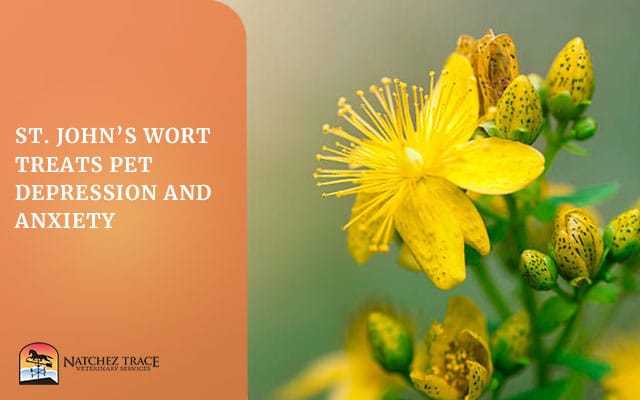History of St. John’s Wort Herbal Remedy
St. John’s Wort (Hypericum perforatum) has been used for ages to treat pains and diseases of the nervous system in humans. Recent studies have shown that just like in humans, St. John’s Wort treats pet depression and anxiety.
In humans, St. John’s Wort is often used to treat nervous system issues such as neuralgia, rheumatic pains, arthritic pains, injuries to the nerves, and coccygeal pains.
Controlled studies in humans show that the hypericin in St. John’s Wort relieved symptoms of anxiety and depression. In humans, St. John’s wort is often used as a herbal replacement for depression and ADHD pharmaceuticals.
St. John’s Wort treats pet depression and anxiety by raising the levels of serotonin, norepinephrine, and dopamine, which helps maintain normal mood and emotional stability.
This is done via the action of hypericin, the active ingredient in St. John’s Wort.
St. John’s Wort for Pets
Pets, just like people, often suffer from depression and anxiety.
If your pet suffers such emotional challenges, St. John’s Wort just might help.
Pets with mild anxiety, phobic conditions, or depression may benefit. Feline hyperesthesia syndrome (also known as “rolling skin disease”), a convulsive disorder of cats, appears amenable to treatment with serotonin reuptake inhibitors, and may benefit from the serotonin-raising effects of St. John’s Wort. Feline hyperesthesia can also be considered a severe form of peripheral neuralgia, which was a traditional indication for St. John’s Wort. Psychogenic alopecia (hair loss resulting from psychological reasons) in both dogs and cats and even acral lick dermatitis in dogs (also called lick granuloma) might similarly benefit, given the herb’s relaxant and peripheral analgesic (pain relieving) effects. Hypericum may also be used to relieve the pain of declawing and acute back pain secondary to disk prolapse. Hypericum appears to be effective in the treatment of feline immune deficiency viruses, although these benefits are probably only seen with the use of liquid extracts. – VCA Animal Hospital
A good rule of thumb to use when giving herbs to pets by weight is:
- Over 60 lbs – Adult Human Dose
- 30-60 lbs – 1/2 Adult Human Dose
- 10-30 lbs – 1/4 Adult Human Dose
- Under 10 lbs – 1/8 Adult Human Dose
St. John’s Wort Side Effects and Drug Interactions
Even though it’s an all-natural treatment, St. John’s Wort may cause side effects and interact with some medications.
The most common side effects of St. John’s Wort use are:
- Photosensitivity
- Skin reactions
- Gastrointestinal upset
- Fatigue/sedation
- Sensitivity to light
- Dizziness
- Dry mouth.
Do not use St. John’s Wort in combination with antidepressant medication.
In addition, interactions can occur between St. John’s Wort and the following medications:
- Antidepressants
- HIV medications
- Transplant Drugs
- Blood thinners
- Heart Medications
- Anticonvulsants
- Migraine Treatments
- Contraceptive Pills
If you’ve tried St. John’s Wort and are still suffering from pet depression and anxiety challenges,
Dr. Smith may be able to help with a TCVM herbal remedy, such as Shen Calmer.







